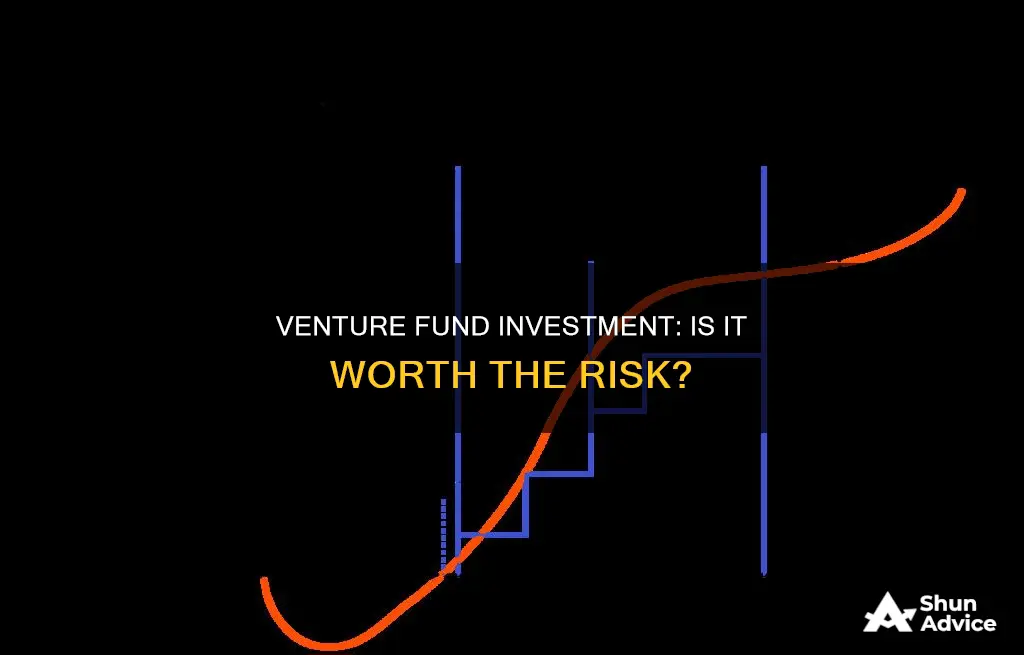
Investing in a venture fund is a risky but potentially rewarding endeavour. Venture funds pool money from investors to finance early-stage startups with high long-term growth potential. The allure of investing in the next Google, Airbnb, Uber, Facebook, or Zoom is strong, but it's important to remember that most startups fail. Venture capital investments are illiquid, high-risk, and should only be undertaken with money that investors can afford to lose. Due diligence is critical when considering a venture fund investment.
| Characteristics | Values |
|---|---|
| Risk | High |
| Returns | High |
| Investment type | Startups, small businesses, private companies |
| Investor type | Wealthy, institutional, accredited |
| Investment amount | Modest amounts of capital |
| Investor involvement | Active role, working directly with entrepreneurs |
| Investment focus | High long-term growth potential |
| Investment structure | Limited partnerships |
| Investor liability | Limited to their investment |
| Investment duration | Long-term, illiquid |
| Investor gains | Significant upside potential |
| Investment research | Due diligence, vetting |
What You'll Learn

What are the risks?
Investing in a venture fund is a high-risk endeavour and should only be undertaken with money that investors can afford to lose. Here are some of the risks to consider:
Illiquidity
Venture capital investments tend to be long-term and illiquid. Many startups take five to ten years to mature, and venture capital funds often operate on a ten-year time frame. This means that investors may need to wait several years to receive their principal investment back, and in some cases, with failed startups, the investment return might be zero.
High Risk of Failure
The failure rate of startups is high, and most will inevitably fail. Venture funds tend to place modest amounts of capital with a large number of companies with larger growth prospects. This means that a single venture fund will invest in many startups, knowing that most will fail, in the hopes that a few will succeed spectacularly.
Lack of Transparency
Public companies are continually analysed and evaluated by research analysts, whereas private companies are not. Startups with new and innovative business concepts also won't have any comparable companies to use as a benchmark for their value. This makes it difficult to know if what you're investing in is worthwhile.
Cost
Venture capital firms typically charge a management fee of about 2% of assets under management, along with additional performance fees ("carry") of about 20%. This means that the VC firm collects a significant share of the profits generated by its investment funds.
Regulatory and Legal Issues
There is a chance that regulatory or legal issues could arise for the startup. Investors should be aware of these potential issues and how they could impact their investment.
Lack of Experience
Many startups are founded by inexperienced managers and entrepreneurs. This lack of experience can increase the risk of failure or poor decision-making.
Limited Liquidity upon Exit
Venture funds typically aim to exit their investments through an initial public offering (IPO) or acquisition by a larger company. However, the uncertainties surrounding these exits can take longer than anticipated, impacting the return on investment.
BlackRock Funds: A Guide to Investing in Their Success
You may want to see also

What are the benefits?
Investing in a venture fund can be a risky but rewarding endeavour. Here are some of the benefits:
High Returns
Venture capital funds tend to invest in companies with high growth potential. While there is always the risk of losing your entire investment, the potential rewards of investing in a successful startup are much higher than more traditional investments.
Diversification
By investing in a number of different startups, you can spread out your risk and potentially increase your chances of seeing a return on your investment.
Early Insights
Investing in a venture fund offers the opportunity to be involved in the early stages of a company's development. This can provide valuable insights into the inner workings of a successful business.
No Collateral Required
Venture capital does not typically require collateral to secure financing, unlike business loans which often need to be secured by business or personal assets.
Expert Guidance
Venture capitalists are experienced investors who know how to spot a good investment opportunity. They are also able to provide valuable business advice and guidance on growth strategies.
Networking Opportunities
Venture capitalists are usually well-connected in the business community. Tapping into these connections could have tremendous benefits, helping to forge new partnerships, build out client bases, and hire key employees.
Access to Larger Amounts of Capital
Venture capital firms can provide funding amounts as small as $100,000 for startups in the seed stage and as high as $25 million for more mature startups. This can allow startups to access more capital than they would be eligible for via traditional business loans.
Pension Fund Investment: Where to Invest for Maximum Returns
You may want to see also

How do I invest?
Investing in a venture capital fund is a high-risk endeavour that should only be undertaken with money that you can afford to lose. Before investing, it is important to conduct thorough research to identify funds that align with your interests and goals. Key factors to consider include the fund's track record, the experience of the managing team, and their investment philosophy.
Historically, only accredited investors had the opportunity to invest in venture capital. In the US, an accredited investor must have a minimum annual income of $200,000, or $300,000 if married, or a net worth exceeding $1 million. However, in recent years, regulatory changes have opened up opportunities for non-accredited investors to participate in equity crowdfunding and invest in venture capital.
There are various ways to invest in venture capital, including funds, stocks, debt, and direct investments. Funds such as SharesPost offer venture capital funds with minimum investments as low as $2,500. Crowdfunding platforms like MicroVentures allow investors to invest in startups for as little as $100. AngelList offers opportunities for both accredited and non-accredited investors to invest in startups, although their funds for non-accredited investors are currently closed. SeedInvest is another crowdfunding platform that allows accredited and non-accredited investors to browse offerings online and invest, with minimum investment amounts varying based on the company.
When investing in startups and venture capital opportunities, it is crucial to research the platform, individual small businesses, the company's owners, and understand the risks involved. Due to the high number of startup ventures that will inevitably fail, venture funds tend to place modest amounts of capital with a large number of companies that have larger growth prospects. It is worth noting that most startups fail, and only about 1% become unicorns. Therefore, venture capital investment should only be a small part of your overall investment portfolio, with experts recommending allocating no more than 5% of your investment dollars to speculative investments.
Index Funds: Ethical Investment or Unregulated Risk?
You may want to see also

What is venture capital?
Venture capital (VC) is a type of private equity and a form of financing for startup companies and small businesses with long-term growth potential. It is a risky investment strategy, but it can offer significant upside potential.
Venture capital generally comes from investors, investment banks, and financial institutions. VC investors provide backing through financing, technological expertise, or managerial experience. VC firms raise money from limited partners (LPs) to invest in promising startups or larger venture funds. These investors can be high-net-worth individuals or institutional investors such as pension funds, insurance companies, or family offices.
Venture capital is typically introduced at various stages of a company's development, from seed funding to early-stage and late-stage funding rounds. Each funding round is often denoted incrementally as Series A, Series B, and so on. The funds raised are used to support innovation, expansion, product development, market research, and business growth.
VC firms play a crucial role in filling the financing gap for high-risk companies at early stages of growth, where public equity markets are unavailable and investments are too risky for banks. They provide both financial backing and expertise to entrepreneurs with exceptional business ideas. In exchange, VC firms gain ownership stakes in the companies they support.
Venture capital investment is not suitable for everyone. It is important to understand the risks involved and only invest money you can afford to lose.
A Guide to Investing in Bridgewater's Alpha Fund
You may want to see also

What are the different stages of financing?
There are several stages of financing for start-ups, each with its own unique characteristics and objectives. Here are the different stages in detail:
Pre-Seed Funding Stage
This is the research phase of starting a business, where entrepreneurs answer critical questions about their idea's viability, uniqueness, costs, business model, and path to market. Funding during this stage typically comes from personal sources or friends and family, and the total value of a startup can range from $10,000 to $100,000.
Seed Funding Stage
At this stage, the idea has been validated and the business has gained some initial traction with customers. Entrepreneurs offer company equity in exchange for larger investments from investors to cover costs such as market research and product development. The value of startups in this phase ranges from $100,000 to $6 million.
Series A Funding
Series A funding marks the entry of venture capitalists, who offer shares in the company in exchange for capital. This stage focuses on optimising the business, offsetting financial losses, further developing products or services, and creating a scalable blueprint for growth. The amount raised in Series A funding can vary, with averages ranging from $2 million to $22 million.
Series B Funding
Startups in the Series B stage have dedicated user bases and steady revenue streams. Investors at this stage help expand market reach, increase market share, and form operational teams. Series B funding is about taking the business to the next level and expanding its capabilities to meet demand.
Series C Funding
Series C funding is for companies already on a solid growth trajectory, often with an interest in global expansion. Investors inject capital into these successful businesses, expecting to receive a proportionate return. Series C funding may also be used to acquire underperforming startups in the same industry or to address subpar performance from the previous funding round.
Mezzanine Funding and Bridge Loans
These financing options are designed for mature businesses valued at over $100 million. Mezzanine loans blend debt and equity, while bridge loans provide short-term financing to close the financial gap between the current phase and an upcoming IPO.
Initial Public Offering (IPO)
The IPO is the pinnacle of startup success, where shares of the company are offered to the public for the first time. It is used to generate funds for further growth or allow startup owners to cash out their shares for personal income.
Excess Cash: Money Market Funds for Smart Investors
You may want to see also
Frequently asked questions
A venture fund pools money from investors to finance early-stage startup companies. Venture funds focus on companies with high long-term growth potential that are in need of capital to fuel their growth and development.
Investing in a venture fund is a high-risk endeavour and you are unlikely to be protected if something goes wrong. Due to the high number of startup ventures that will inevitably fail, you should only invest money that you can afford to lose.
The higher the risk, the higher the reward. If you find a "unicorn" – a private startup company valued at $1 billion or more – within your portfolio, it can more than make up for the failures. The earlier the stage of investment, the higher the risk and return.
Typically, the investors in VC funds are institutional investors such as foundations, insurance companies, pension funds, or family offices. However, high-net-worth individuals who are accredited investors can also participate in venture capital funds and direct investments. The minimum investment and qualifications required differ with each venture capital fund offering.







